The Importance of Scientific Thinking for Young Learners' Future
VerifiedAdded on 2023/04/21
|9
|2364
|382
Essay
AI Summary
This essay explores the crucial role of scientific thinking in preparing young learners for the future. It argues that scientific learning, combined with 21st-century skills, provides a better learning experience. The essay discusses relevant skills for scientific thinking, including insightful, experiential, and incessant thinking, and emphasizes the importance of curiosity, observation, and experimentation. It draws on examples from the Australian curriculum to illustrate the application of scientific thinking. The essay highlights the significance of skills like creativity, communication, critical thinking, and problem-solving. The essay also underscores the importance of analytical and synthetic skills, and the need for originality and inventiveness in the learning process. In conclusion, the essay emphasizes the benefits of scientific thinking in daily life and the value of critical and logical thinking in problem-solving.
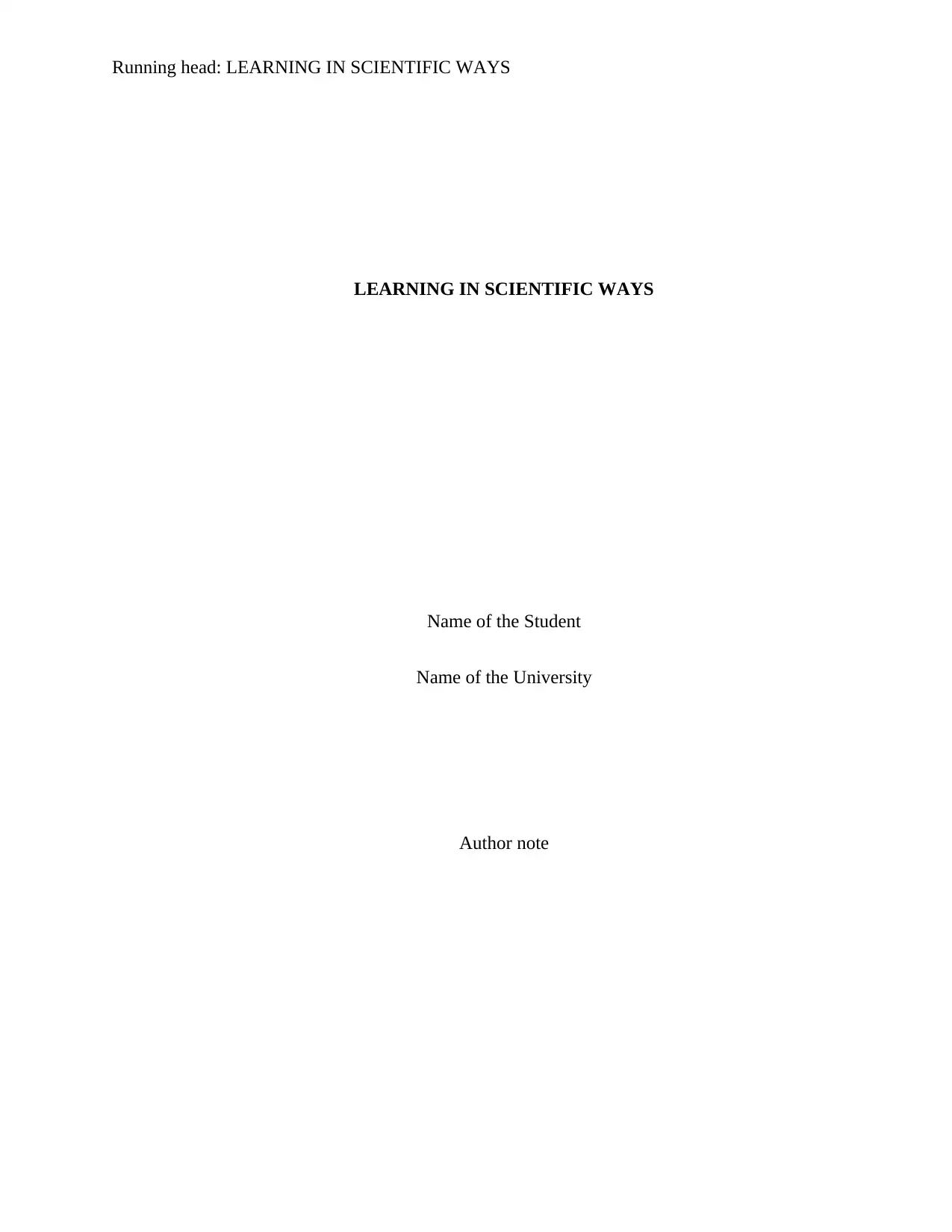
Running head: LEARNING IN SCIENTIFIC WAYS
LEARNING IN SCIENTIFIC WAYS
Name of the Student
Name of the University
Author note
LEARNING IN SCIENTIFIC WAYS
Name of the Student
Name of the University
Author note
Paraphrase This Document
Need a fresh take? Get an instant paraphrase of this document with our AI Paraphraser
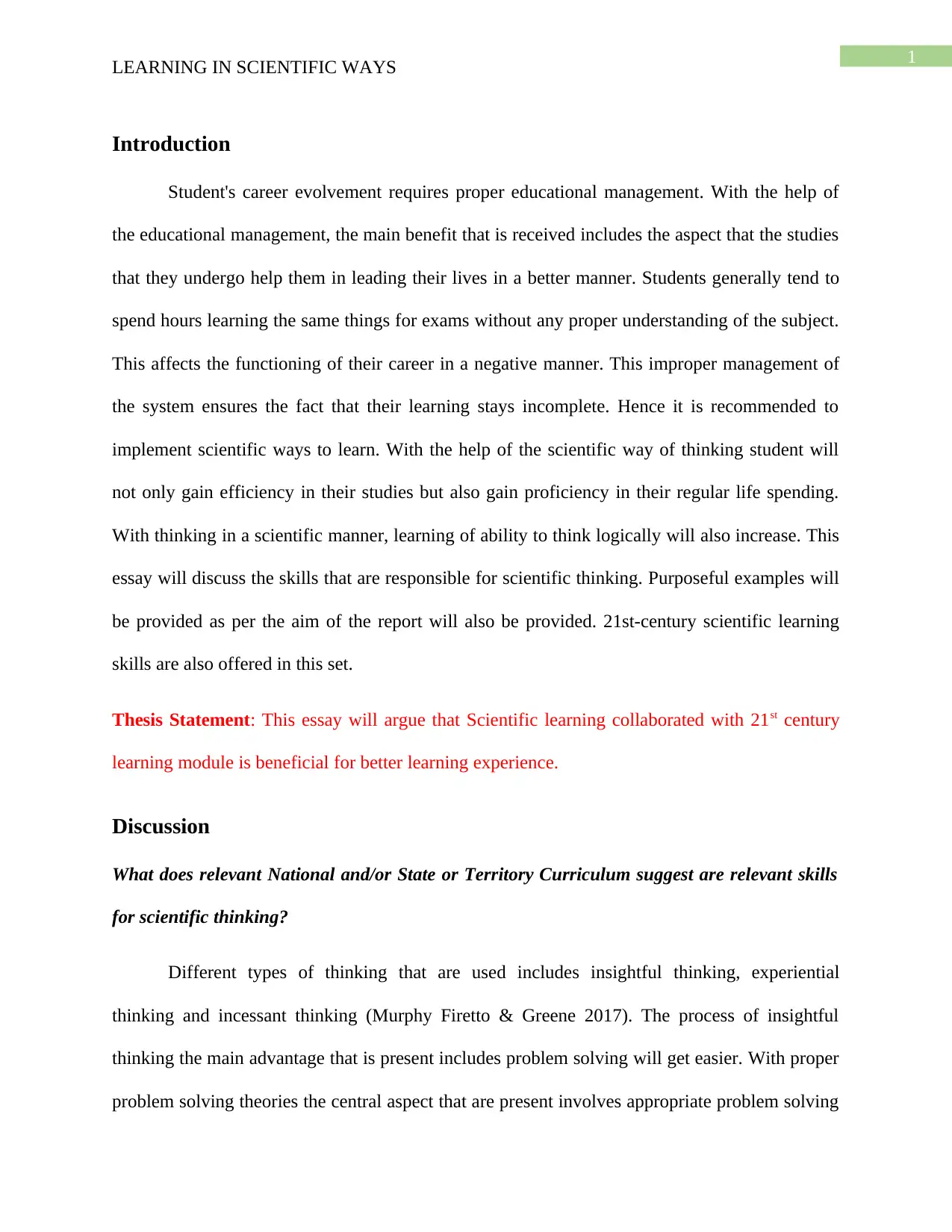
1
LEARNING IN SCIENTIFIC WAYS
Introduction
Student's career evolvement requires proper educational management. With the help of
the educational management, the main benefit that is received includes the aspect that the studies
that they undergo help them in leading their lives in a better manner. Students generally tend to
spend hours learning the same things for exams without any proper understanding of the subject.
This affects the functioning of their career in a negative manner. This improper management of
the system ensures the fact that their learning stays incomplete. Hence it is recommended to
implement scientific ways to learn. With the help of the scientific way of thinking student will
not only gain efficiency in their studies but also gain proficiency in their regular life spending.
With thinking in a scientific manner, learning of ability to think logically will also increase. This
essay will discuss the skills that are responsible for scientific thinking. Purposeful examples will
be provided as per the aim of the report will also be provided. 21st-century scientific learning
skills are also offered in this set.
Thesis Statement: This essay will argue that Scientific learning collaborated with 21st century
learning module is beneficial for better learning experience.
Discussion
What does relevant National and/or State or Territory Curriculum suggest are relevant skills
for scientific thinking?
Different types of thinking that are used includes insightful thinking, experiential
thinking and incessant thinking (Murphy Firetto & Greene 2017). The process of insightful
thinking the main advantage that is present includes problem solving will get easier. With proper
problem solving theories the central aspect that are present involves appropriate problem solving
LEARNING IN SCIENTIFIC WAYS
Introduction
Student's career evolvement requires proper educational management. With the help of
the educational management, the main benefit that is received includes the aspect that the studies
that they undergo help them in leading their lives in a better manner. Students generally tend to
spend hours learning the same things for exams without any proper understanding of the subject.
This affects the functioning of their career in a negative manner. This improper management of
the system ensures the fact that their learning stays incomplete. Hence it is recommended to
implement scientific ways to learn. With the help of the scientific way of thinking student will
not only gain efficiency in their studies but also gain proficiency in their regular life spending.
With thinking in a scientific manner, learning of ability to think logically will also increase. This
essay will discuss the skills that are responsible for scientific thinking. Purposeful examples will
be provided as per the aim of the report will also be provided. 21st-century scientific learning
skills are also offered in this set.
Thesis Statement: This essay will argue that Scientific learning collaborated with 21st century
learning module is beneficial for better learning experience.
Discussion
What does relevant National and/or State or Territory Curriculum suggest are relevant skills
for scientific thinking?
Different types of thinking that are used includes insightful thinking, experiential
thinking and incessant thinking (Murphy Firetto & Greene 2017). The process of insightful
thinking the main advantage that is present includes problem solving will get easier. With proper
problem solving theories the central aspect that are present involves appropriate problem solving
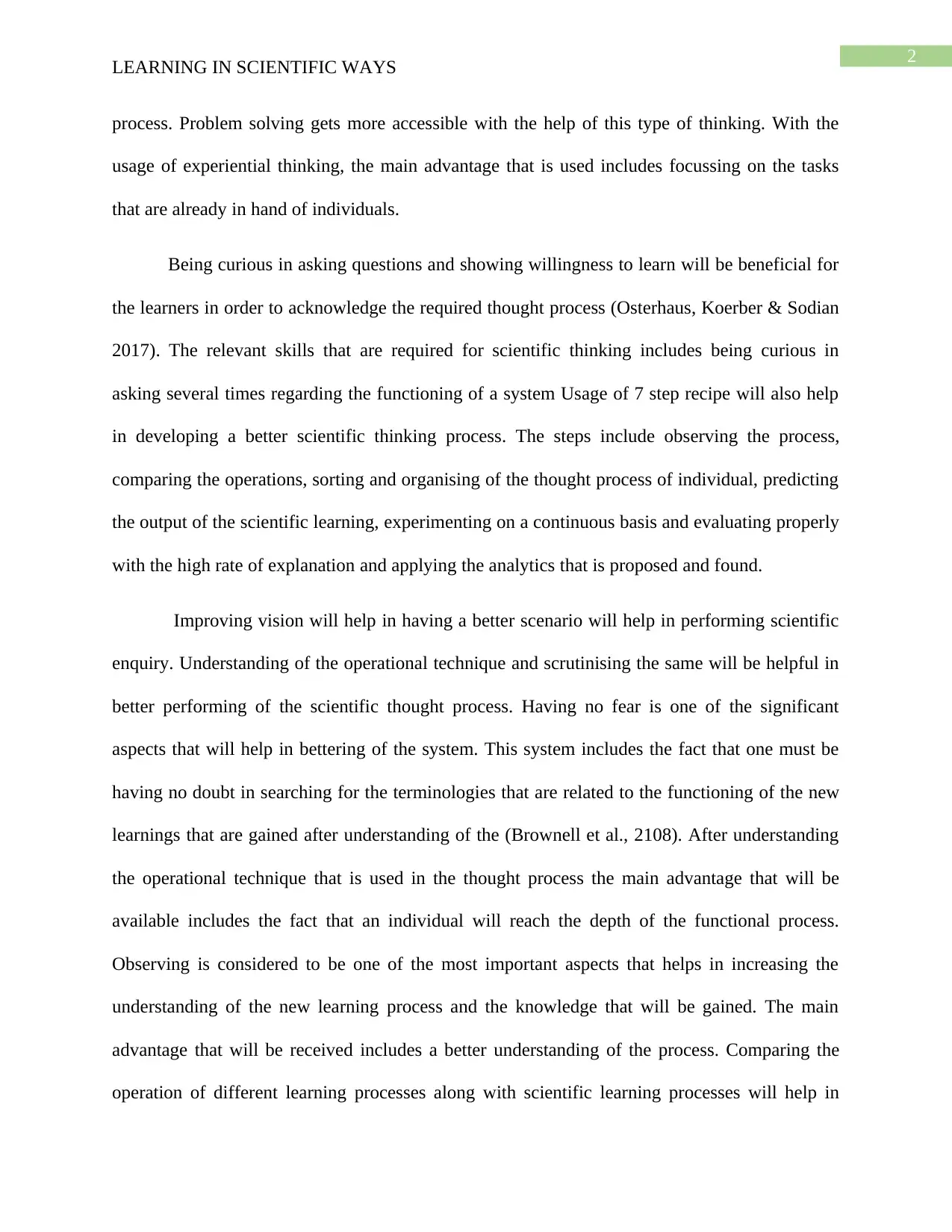
2
LEARNING IN SCIENTIFIC WAYS
process. Problem solving gets more accessible with the help of this type of thinking. With the
usage of experiential thinking, the main advantage that is used includes focussing on the tasks
that are already in hand of individuals.
Being curious in asking questions and showing willingness to learn will be beneficial for
the learners in order to acknowledge the required thought process (Osterhaus, Koerber & Sodian
2017). The relevant skills that are required for scientific thinking includes being curious in
asking several times regarding the functioning of a system Usage of 7 step recipe will also help
in developing a better scientific thinking process. The steps include observing the process,
comparing the operations, sorting and organising of the thought process of individual, predicting
the output of the scientific learning, experimenting on a continuous basis and evaluating properly
with the high rate of explanation and applying the analytics that is proposed and found.
Improving vision will help in having a better scenario will help in performing scientific
enquiry. Understanding of the operational technique and scrutinising the same will be helpful in
better performing of the scientific thought process. Having no fear is one of the significant
aspects that will help in bettering of the system. This system includes the fact that one must be
having no doubt in searching for the terminologies that are related to the functioning of the new
learnings that are gained after understanding of the (Brownell et al., 2108). After understanding
the operational technique that is used in the thought process the main advantage that will be
available includes the fact that an individual will reach the depth of the functional process.
Observing is considered to be one of the most important aspects that helps in increasing the
understanding of the new learning process and the knowledge that will be gained. The main
advantage that will be received includes a better understanding of the process. Comparing the
operation of different learning processes along with scientific learning processes will help in
LEARNING IN SCIENTIFIC WAYS
process. Problem solving gets more accessible with the help of this type of thinking. With the
usage of experiential thinking, the main advantage that is used includes focussing on the tasks
that are already in hand of individuals.
Being curious in asking questions and showing willingness to learn will be beneficial for
the learners in order to acknowledge the required thought process (Osterhaus, Koerber & Sodian
2017). The relevant skills that are required for scientific thinking includes being curious in
asking several times regarding the functioning of a system Usage of 7 step recipe will also help
in developing a better scientific thinking process. The steps include observing the process,
comparing the operations, sorting and organising of the thought process of individual, predicting
the output of the scientific learning, experimenting on a continuous basis and evaluating properly
with the high rate of explanation and applying the analytics that is proposed and found.
Improving vision will help in having a better scenario will help in performing scientific
enquiry. Understanding of the operational technique and scrutinising the same will be helpful in
better performing of the scientific thought process. Having no fear is one of the significant
aspects that will help in bettering of the system. This system includes the fact that one must be
having no doubt in searching for the terminologies that are related to the functioning of the new
learnings that are gained after understanding of the (Brownell et al., 2108). After understanding
the operational technique that is used in the thought process the main advantage that will be
available includes the fact that an individual will reach the depth of the functional process.
Observing is considered to be one of the most important aspects that helps in increasing the
understanding of the new learning process and the knowledge that will be gained. The main
advantage that will be received includes a better understanding of the process. Comparing the
operation of different learning processes along with scientific learning processes will help in
⊘ This is a preview!⊘
Do you want full access?
Subscribe today to unlock all pages.

Trusted by 1+ million students worldwide
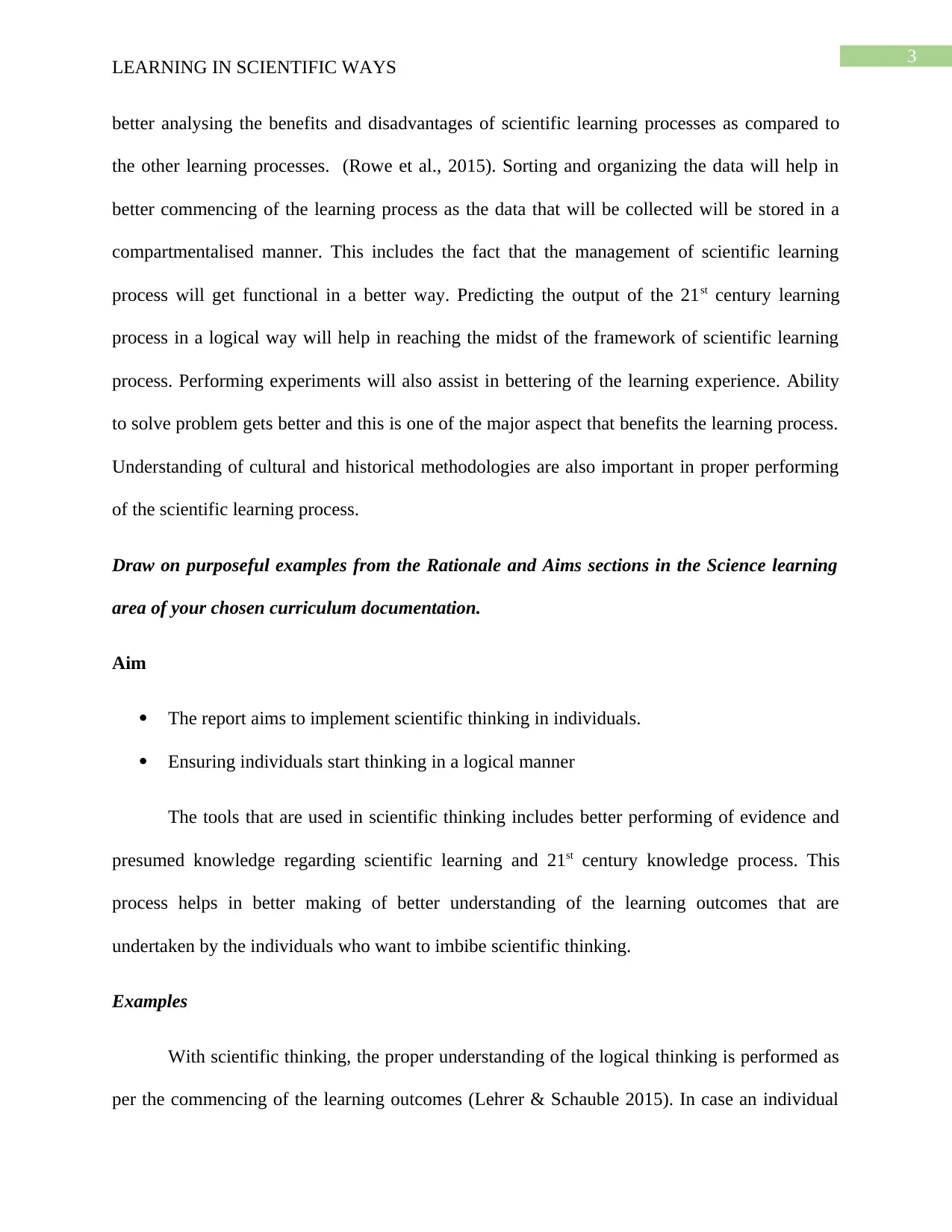
3
LEARNING IN SCIENTIFIC WAYS
better analysing the benefits and disadvantages of scientific learning processes as compared to
the other learning processes. (Rowe et al., 2015). Sorting and organizing the data will help in
better commencing of the learning process as the data that will be collected will be stored in a
compartmentalised manner. This includes the fact that the management of scientific learning
process will get functional in a better way. Predicting the output of the 21st century learning
process in a logical way will help in reaching the midst of the framework of scientific learning
process. Performing experiments will also assist in bettering of the learning experience. Ability
to solve problem gets better and this is one of the major aspect that benefits the learning process.
Understanding of cultural and historical methodologies are also important in proper performing
of the scientific learning process.
Draw on purposeful examples from the Rationale and Aims sections in the Science learning
area of your chosen curriculum documentation.
Aim
The report aims to implement scientific thinking in individuals.
Ensuring individuals start thinking in a logical manner
The tools that are used in scientific thinking includes better performing of evidence and
presumed knowledge regarding scientific learning and 21st century knowledge process. This
process helps in better making of better understanding of the learning outcomes that are
undertaken by the individuals who want to imbibe scientific thinking.
Examples
With scientific thinking, the proper understanding of the logical thinking is performed as
per the commencing of the learning outcomes (Lehrer & Schauble 2015). In case an individual
LEARNING IN SCIENTIFIC WAYS
better analysing the benefits and disadvantages of scientific learning processes as compared to
the other learning processes. (Rowe et al., 2015). Sorting and organizing the data will help in
better commencing of the learning process as the data that will be collected will be stored in a
compartmentalised manner. This includes the fact that the management of scientific learning
process will get functional in a better way. Predicting the output of the 21st century learning
process in a logical way will help in reaching the midst of the framework of scientific learning
process. Performing experiments will also assist in bettering of the learning experience. Ability
to solve problem gets better and this is one of the major aspect that benefits the learning process.
Understanding of cultural and historical methodologies are also important in proper performing
of the scientific learning process.
Draw on purposeful examples from the Rationale and Aims sections in the Science learning
area of your chosen curriculum documentation.
Aim
The report aims to implement scientific thinking in individuals.
Ensuring individuals start thinking in a logical manner
The tools that are used in scientific thinking includes better performing of evidence and
presumed knowledge regarding scientific learning and 21st century knowledge process. This
process helps in better making of better understanding of the learning outcomes that are
undertaken by the individuals who want to imbibe scientific thinking.
Examples
With scientific thinking, the proper understanding of the logical thinking is performed as
per the commencing of the learning outcomes (Lehrer & Schauble 2015). In case an individual
Paraphrase This Document
Need a fresh take? Get an instant paraphrase of this document with our AI Paraphraser
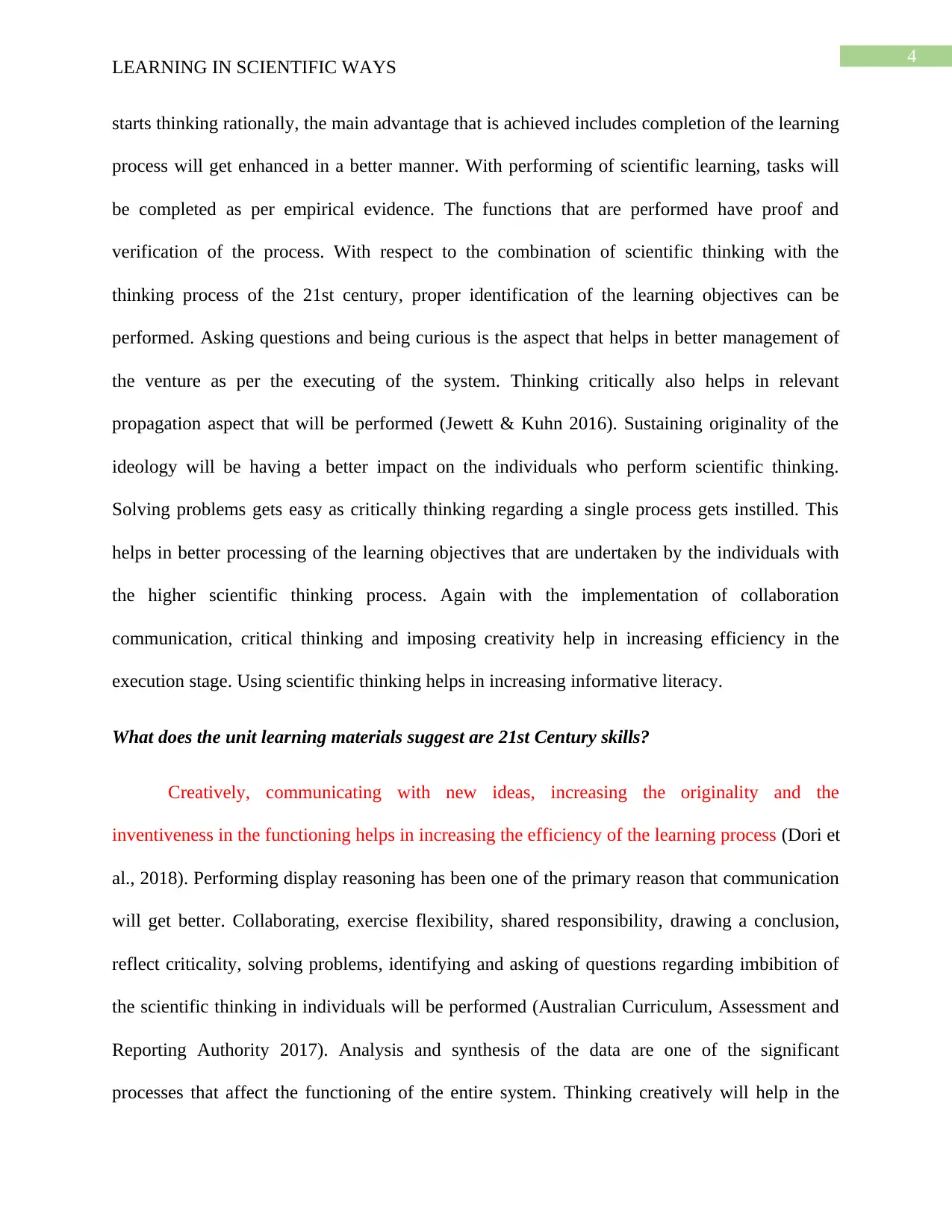
4
LEARNING IN SCIENTIFIC WAYS
starts thinking rationally, the main advantage that is achieved includes completion of the learning
process will get enhanced in a better manner. With performing of scientific learning, tasks will
be completed as per empirical evidence. The functions that are performed have proof and
verification of the process. With respect to the combination of scientific thinking with the
thinking process of the 21st century, proper identification of the learning objectives can be
performed. Asking questions and being curious is the aspect that helps in better management of
the venture as per the executing of the system. Thinking critically also helps in relevant
propagation aspect that will be performed (Jewett & Kuhn 2016). Sustaining originality of the
ideology will be having a better impact on the individuals who perform scientific thinking.
Solving problems gets easy as critically thinking regarding a single process gets instilled. This
helps in better processing of the learning objectives that are undertaken by the individuals with
the higher scientific thinking process. Again with the implementation of collaboration
communication, critical thinking and imposing creativity help in increasing efficiency in the
execution stage. Using scientific thinking helps in increasing informative literacy.
What does the unit learning materials suggest are 21st Century skills?
Creatively, communicating with new ideas, increasing the originality and the
inventiveness in the functioning helps in increasing the efficiency of the learning process (Dori et
al., 2018). Performing display reasoning has been one of the primary reason that communication
will get better. Collaborating, exercise flexibility, shared responsibility, drawing a conclusion,
reflect criticality, solving problems, identifying and asking of questions regarding imbibition of
the scientific thinking in individuals will be performed (Australian Curriculum, Assessment and
Reporting Authority 2017). Analysis and synthesis of the data are one of the significant
processes that affect the functioning of the entire system. Thinking creatively will help in the
LEARNING IN SCIENTIFIC WAYS
starts thinking rationally, the main advantage that is achieved includes completion of the learning
process will get enhanced in a better manner. With performing of scientific learning, tasks will
be completed as per empirical evidence. The functions that are performed have proof and
verification of the process. With respect to the combination of scientific thinking with the
thinking process of the 21st century, proper identification of the learning objectives can be
performed. Asking questions and being curious is the aspect that helps in better management of
the venture as per the executing of the system. Thinking critically also helps in relevant
propagation aspect that will be performed (Jewett & Kuhn 2016). Sustaining originality of the
ideology will be having a better impact on the individuals who perform scientific thinking.
Solving problems gets easy as critically thinking regarding a single process gets instilled. This
helps in better processing of the learning objectives that are undertaken by the individuals with
the higher scientific thinking process. Again with the implementation of collaboration
communication, critical thinking and imposing creativity help in increasing efficiency in the
execution stage. Using scientific thinking helps in increasing informative literacy.
What does the unit learning materials suggest are 21st Century skills?
Creatively, communicating with new ideas, increasing the originality and the
inventiveness in the functioning helps in increasing the efficiency of the learning process (Dori et
al., 2018). Performing display reasoning has been one of the primary reason that communication
will get better. Collaborating, exercise flexibility, shared responsibility, drawing a conclusion,
reflect criticality, solving problems, identifying and asking of questions regarding imbibition of
the scientific thinking in individuals will be performed (Australian Curriculum, Assessment and
Reporting Authority 2017). Analysis and synthesis of the data are one of the significant
processes that affect the functioning of the entire system. Thinking creatively will help in the
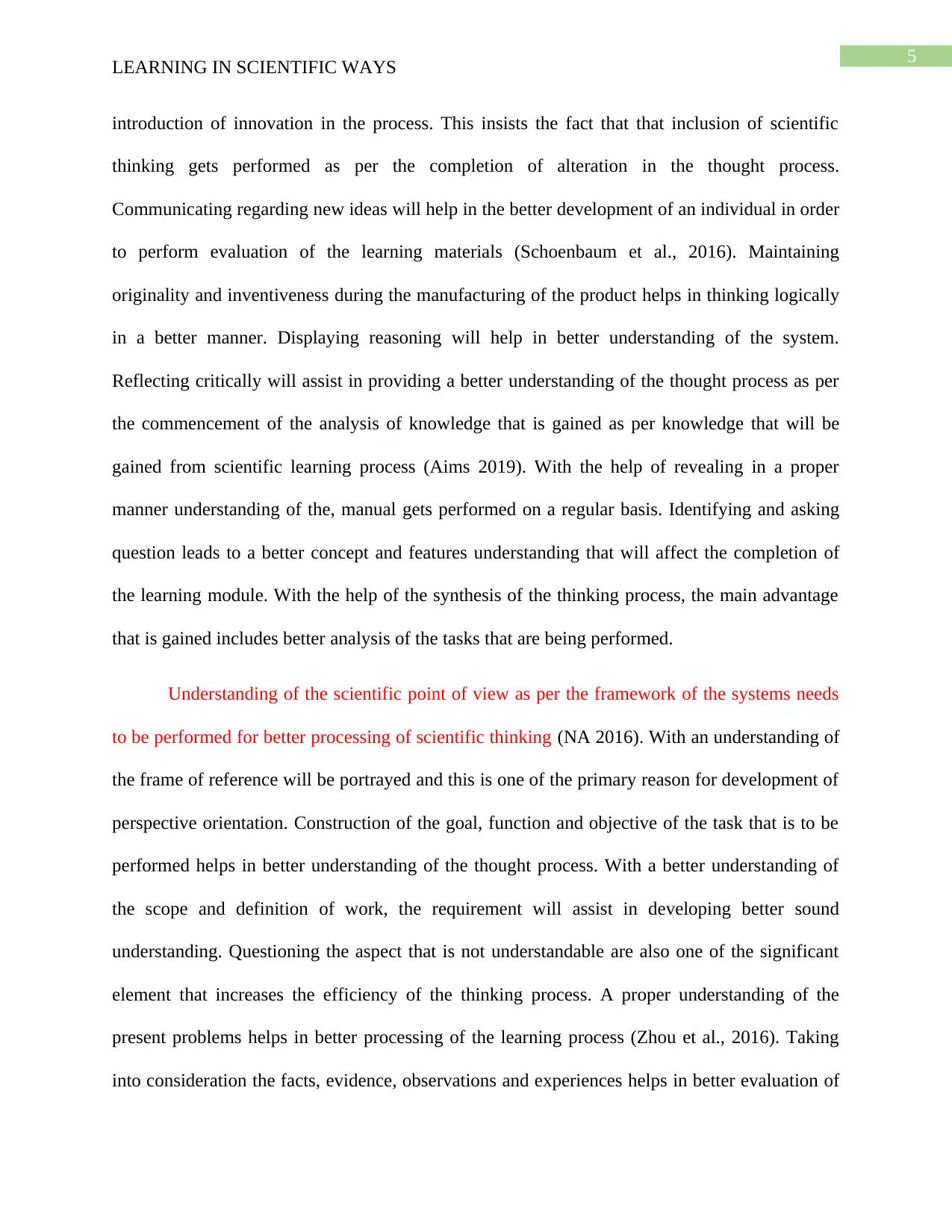
5
LEARNING IN SCIENTIFIC WAYS
introduction of innovation in the process. This insists the fact that that inclusion of scientific
thinking gets performed as per the completion of alteration in the thought process.
Communicating regarding new ideas will help in the better development of an individual in order
to perform evaluation of the learning materials (Schoenbaum et al., 2016). Maintaining
originality and inventiveness during the manufacturing of the product helps in thinking logically
in a better manner. Displaying reasoning will help in better understanding of the system.
Reflecting critically will assist in providing a better understanding of the thought process as per
the commencement of the analysis of knowledge that is gained as per knowledge that will be
gained from scientific learning process (Aims 2019). With the help of revealing in a proper
manner understanding of the, manual gets performed on a regular basis. Identifying and asking
question leads to a better concept and features understanding that will affect the completion of
the learning module. With the help of the synthesis of the thinking process, the main advantage
that is gained includes better analysis of the tasks that are being performed.
Understanding of the scientific point of view as per the framework of the systems needs
to be performed for better processing of scientific thinking (NA 2016). With an understanding of
the frame of reference will be portrayed and this is one of the primary reason for development of
perspective orientation. Construction of the goal, function and objective of the task that is to be
performed helps in better understanding of the thought process. With a better understanding of
the scope and definition of work, the requirement will assist in developing better sound
understanding. Questioning the aspect that is not understandable are also one of the significant
element that increases the efficiency of the thinking process. A proper understanding of the
present problems helps in better processing of the learning process (Zhou et al., 2016). Taking
into consideration the facts, evidence, observations and experiences helps in better evaluation of
LEARNING IN SCIENTIFIC WAYS
introduction of innovation in the process. This insists the fact that that inclusion of scientific
thinking gets performed as per the completion of alteration in the thought process.
Communicating regarding new ideas will help in the better development of an individual in order
to perform evaluation of the learning materials (Schoenbaum et al., 2016). Maintaining
originality and inventiveness during the manufacturing of the product helps in thinking logically
in a better manner. Displaying reasoning will help in better understanding of the system.
Reflecting critically will assist in providing a better understanding of the thought process as per
the commencement of the analysis of knowledge that is gained as per knowledge that will be
gained from scientific learning process (Aims 2019). With the help of revealing in a proper
manner understanding of the, manual gets performed on a regular basis. Identifying and asking
question leads to a better concept and features understanding that will affect the completion of
the learning module. With the help of the synthesis of the thinking process, the main advantage
that is gained includes better analysis of the tasks that are being performed.
Understanding of the scientific point of view as per the framework of the systems needs
to be performed for better processing of scientific thinking (NA 2016). With an understanding of
the frame of reference will be portrayed and this is one of the primary reason for development of
perspective orientation. Construction of the goal, function and objective of the task that is to be
performed helps in better understanding of the thought process. With a better understanding of
the scope and definition of work, the requirement will assist in developing better sound
understanding. Questioning the aspect that is not understandable are also one of the significant
element that increases the efficiency of the thinking process. A proper understanding of the
present problems helps in better processing of the learning process (Zhou et al., 2016). Taking
into consideration the facts, evidence, observations and experiences helps in better evaluation of
⊘ This is a preview!⊘
Do you want full access?
Subscribe today to unlock all pages.

Trusted by 1+ million students worldwide
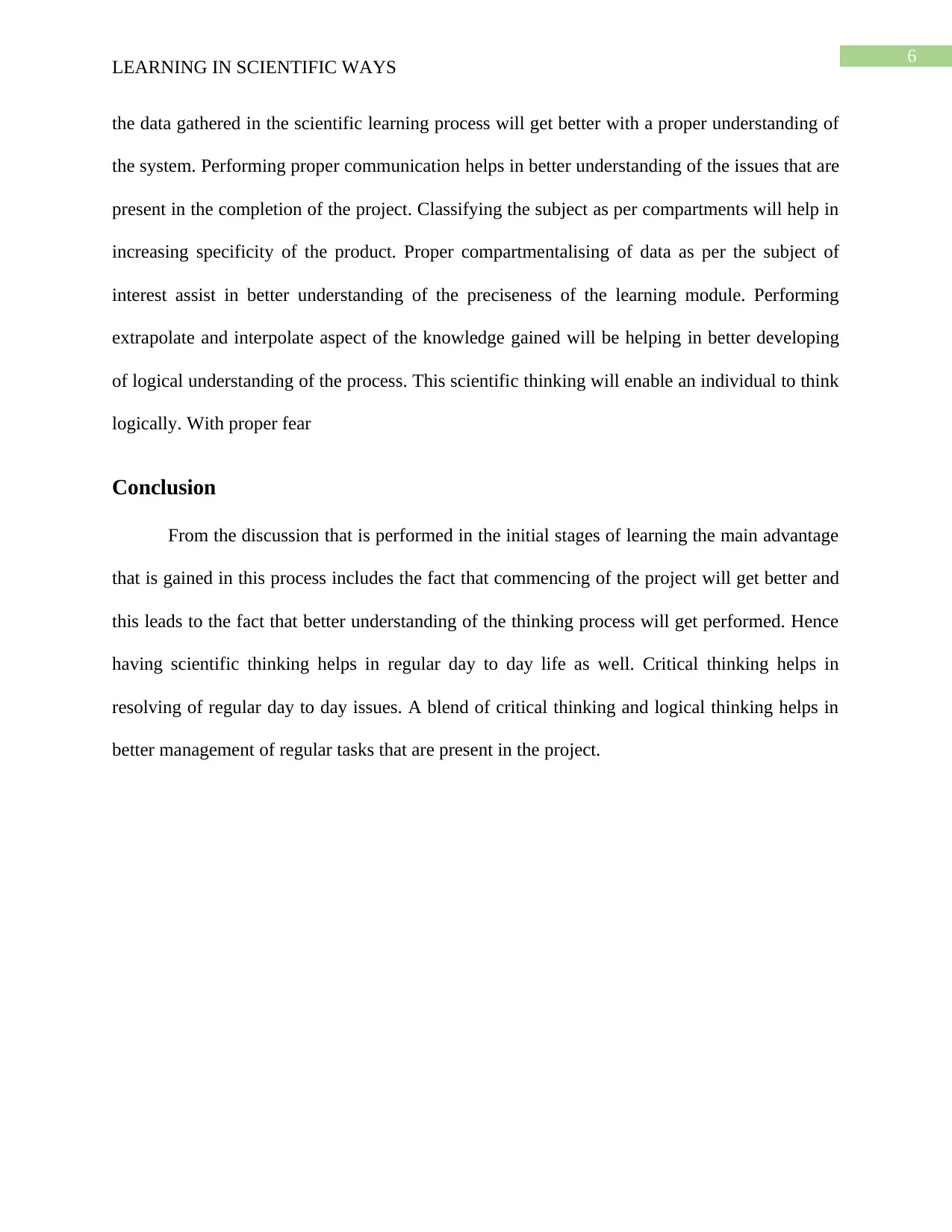
6
LEARNING IN SCIENTIFIC WAYS
the data gathered in the scientific learning process will get better with a proper understanding of
the system. Performing proper communication helps in better understanding of the issues that are
present in the completion of the project. Classifying the subject as per compartments will help in
increasing specificity of the product. Proper compartmentalising of data as per the subject of
interest assist in better understanding of the preciseness of the learning module. Performing
extrapolate and interpolate aspect of the knowledge gained will be helping in better developing
of logical understanding of the process. This scientific thinking will enable an individual to think
logically. With proper fear
Conclusion
From the discussion that is performed in the initial stages of learning the main advantage
that is gained in this process includes the fact that commencing of the project will get better and
this leads to the fact that better understanding of the thinking process will get performed. Hence
having scientific thinking helps in regular day to day life as well. Critical thinking helps in
resolving of regular day to day issues. A blend of critical thinking and logical thinking helps in
better management of regular tasks that are present in the project.
LEARNING IN SCIENTIFIC WAYS
the data gathered in the scientific learning process will get better with a proper understanding of
the system. Performing proper communication helps in better understanding of the issues that are
present in the completion of the project. Classifying the subject as per compartments will help in
increasing specificity of the product. Proper compartmentalising of data as per the subject of
interest assist in better understanding of the preciseness of the learning module. Performing
extrapolate and interpolate aspect of the knowledge gained will be helping in better developing
of logical understanding of the process. This scientific thinking will enable an individual to think
logically. With proper fear
Conclusion
From the discussion that is performed in the initial stages of learning the main advantage
that is gained in this process includes the fact that commencing of the project will get better and
this leads to the fact that better understanding of the thinking process will get performed. Hence
having scientific thinking helps in regular day to day life as well. Critical thinking helps in
resolving of regular day to day issues. A blend of critical thinking and logical thinking helps in
better management of regular tasks that are present in the project.
Paraphrase This Document
Need a fresh take? Get an instant paraphrase of this document with our AI Paraphraser
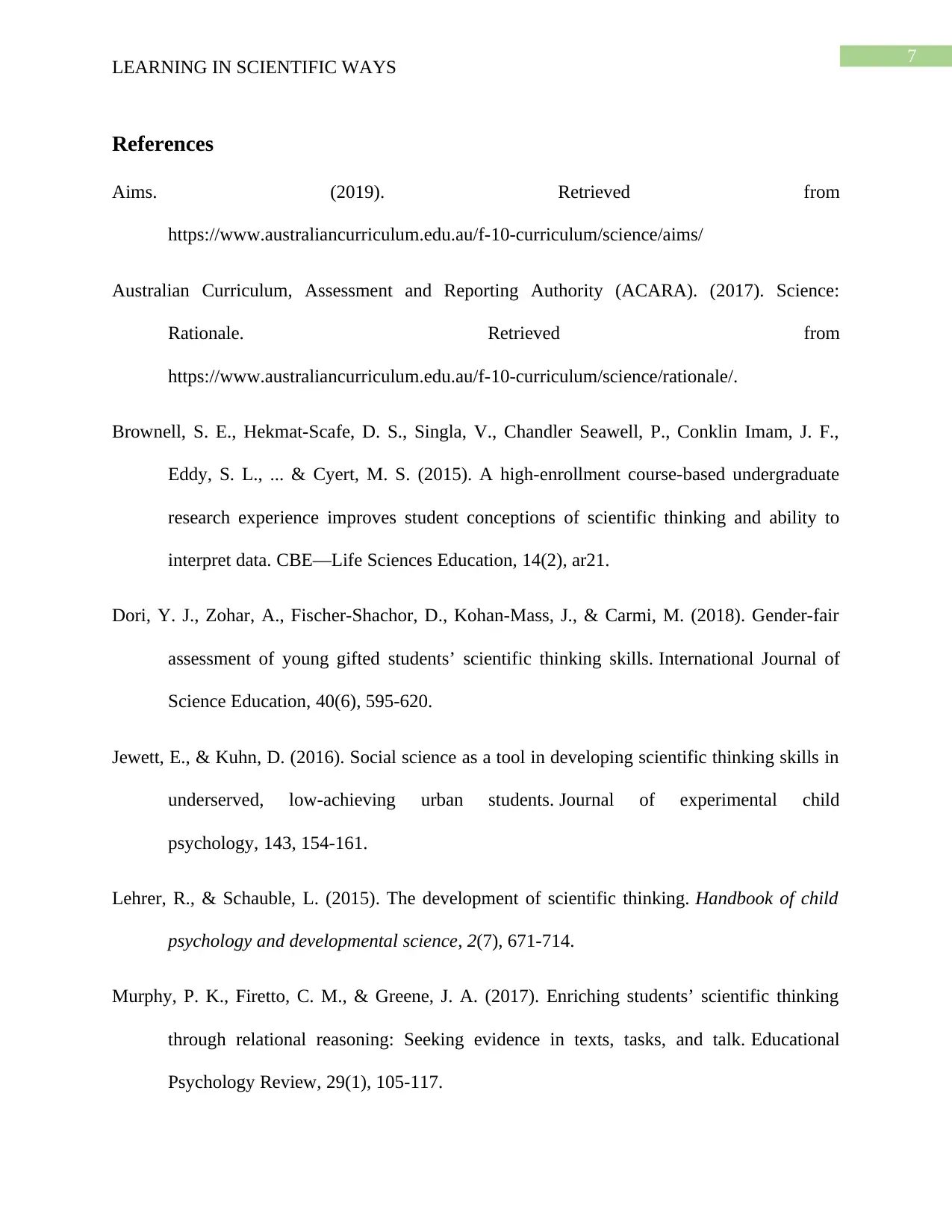
7
LEARNING IN SCIENTIFIC WAYS
References
Aims. (2019). Retrieved from
https://www.australiancurriculum.edu.au/f-10-curriculum/science/aims/
Australian Curriculum, Assessment and Reporting Authority (ACARA). (2017). Science:
Rationale. Retrieved from
https://www.australiancurriculum.edu.au/f-10-curriculum/science/rationale/.
Brownell, S. E., Hekmat-Scafe, D. S., Singla, V., Chandler Seawell, P., Conklin Imam, J. F.,
Eddy, S. L., ... & Cyert, M. S. (2015). A high-enrollment course-based undergraduate
research experience improves student conceptions of scientific thinking and ability to
interpret data. CBE—Life Sciences Education, 14(2), ar21.
Dori, Y. J., Zohar, A., Fischer-Shachor, D., Kohan-Mass, J., & Carmi, M. (2018). Gender-fair
assessment of young gifted students’ scientific thinking skills. International Journal of
Science Education, 40(6), 595-620.
Jewett, E., & Kuhn, D. (2016). Social science as a tool in developing scientific thinking skills in
underserved, low-achieving urban students. Journal of experimental child
psychology, 143, 154-161.
Lehrer, R., & Schauble, L. (2015). The development of scientific thinking. Handbook of child
psychology and developmental science, 2(7), 671-714.
Murphy, P. K., Firetto, C. M., & Greene, J. A. (2017). Enriching students’ scientific thinking
through relational reasoning: Seeking evidence in texts, tasks, and talk. Educational
Psychology Review, 29(1), 105-117.
LEARNING IN SCIENTIFIC WAYS
References
Aims. (2019). Retrieved from
https://www.australiancurriculum.edu.au/f-10-curriculum/science/aims/
Australian Curriculum, Assessment and Reporting Authority (ACARA). (2017). Science:
Rationale. Retrieved from
https://www.australiancurriculum.edu.au/f-10-curriculum/science/rationale/.
Brownell, S. E., Hekmat-Scafe, D. S., Singla, V., Chandler Seawell, P., Conklin Imam, J. F.,
Eddy, S. L., ... & Cyert, M. S. (2015). A high-enrollment course-based undergraduate
research experience improves student conceptions of scientific thinking and ability to
interpret data. CBE—Life Sciences Education, 14(2), ar21.
Dori, Y. J., Zohar, A., Fischer-Shachor, D., Kohan-Mass, J., & Carmi, M. (2018). Gender-fair
assessment of young gifted students’ scientific thinking skills. International Journal of
Science Education, 40(6), 595-620.
Jewett, E., & Kuhn, D. (2016). Social science as a tool in developing scientific thinking skills in
underserved, low-achieving urban students. Journal of experimental child
psychology, 143, 154-161.
Lehrer, R., & Schauble, L. (2015). The development of scientific thinking. Handbook of child
psychology and developmental science, 2(7), 671-714.
Murphy, P. K., Firetto, C. M., & Greene, J. A. (2017). Enriching students’ scientific thinking
through relational reasoning: Seeking evidence in texts, tasks, and talk. Educational
Psychology Review, 29(1), 105-117.
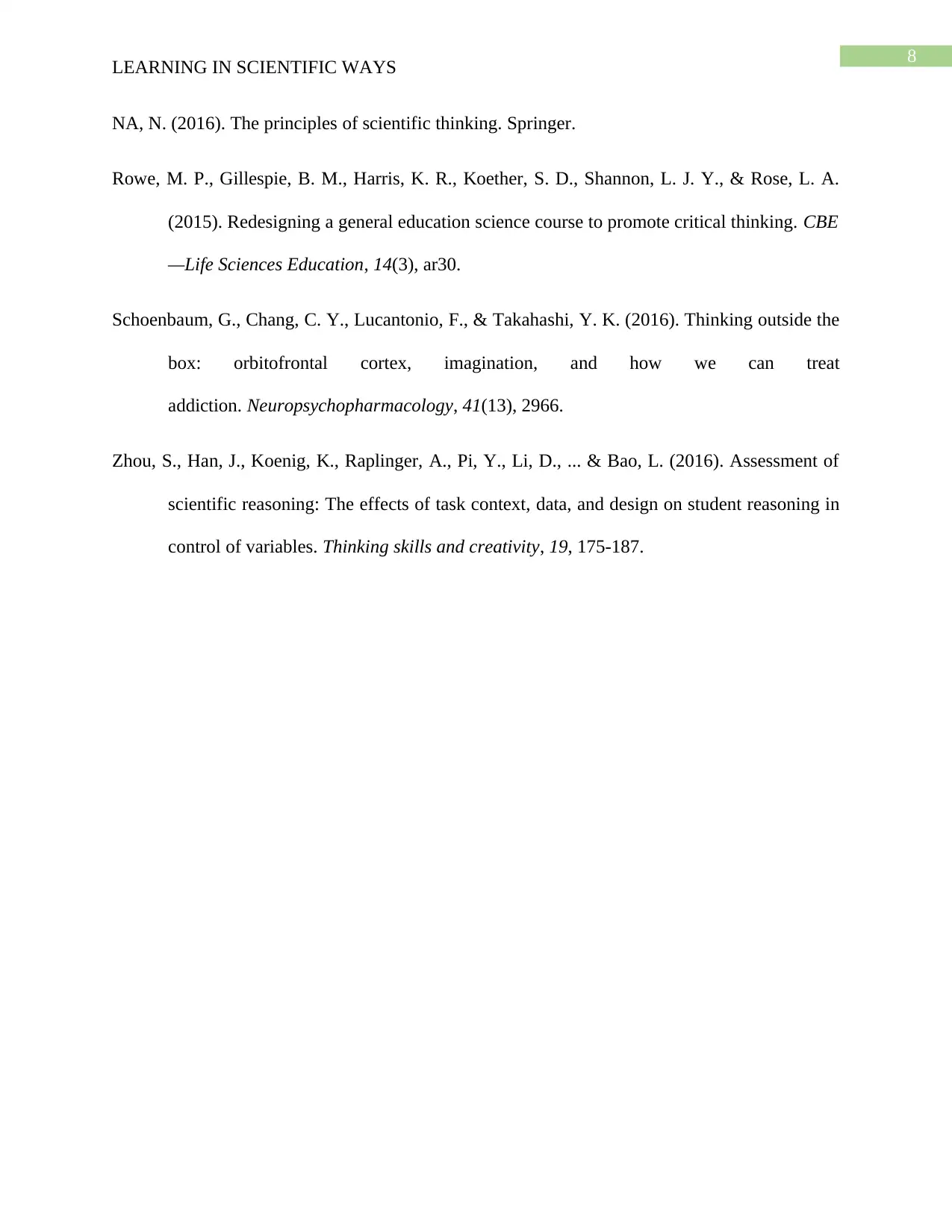
8
LEARNING IN SCIENTIFIC WAYS
NA, N. (2016). The principles of scientific thinking. Springer.
Rowe, M. P., Gillespie, B. M., Harris, K. R., Koether, S. D., Shannon, L. J. Y., & Rose, L. A.
(2015). Redesigning a general education science course to promote critical thinking. CBE
—Life Sciences Education, 14(3), ar30.
Schoenbaum, G., Chang, C. Y., Lucantonio, F., & Takahashi, Y. K. (2016). Thinking outside the
box: orbitofrontal cortex, imagination, and how we can treat
addiction. Neuropsychopharmacology, 41(13), 2966.
Zhou, S., Han, J., Koenig, K., Raplinger, A., Pi, Y., Li, D., ... & Bao, L. (2016). Assessment of
scientific reasoning: The effects of task context, data, and design on student reasoning in
control of variables. Thinking skills and creativity, 19, 175-187.
LEARNING IN SCIENTIFIC WAYS
NA, N. (2016). The principles of scientific thinking. Springer.
Rowe, M. P., Gillespie, B. M., Harris, K. R., Koether, S. D., Shannon, L. J. Y., & Rose, L. A.
(2015). Redesigning a general education science course to promote critical thinking. CBE
—Life Sciences Education, 14(3), ar30.
Schoenbaum, G., Chang, C. Y., Lucantonio, F., & Takahashi, Y. K. (2016). Thinking outside the
box: orbitofrontal cortex, imagination, and how we can treat
addiction. Neuropsychopharmacology, 41(13), 2966.
Zhou, S., Han, J., Koenig, K., Raplinger, A., Pi, Y., Li, D., ... & Bao, L. (2016). Assessment of
scientific reasoning: The effects of task context, data, and design on student reasoning in
control of variables. Thinking skills and creativity, 19, 175-187.
⊘ This is a preview!⊘
Do you want full access?
Subscribe today to unlock all pages.

Trusted by 1+ million students worldwide
1 out of 9
Related Documents
Your All-in-One AI-Powered Toolkit for Academic Success.
+13062052269
info@desklib.com
Available 24*7 on WhatsApp / Email
![[object Object]](/_next/static/media/star-bottom.7253800d.svg)
Unlock your academic potential
Copyright © 2020–2025 A2Z Services. All Rights Reserved. Developed and managed by ZUCOL.




